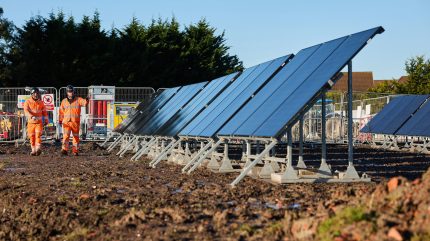
A collaborative trial between infrastructure services and construction company Kier and the Environment Agency in Somerset, UK, has demonstrated promising initial results in harnessing green hydrogen energy as a primary power source for construction sites.
The trial, which is set to run for at least 12 months, is testing the feasibility of solar power with green hydrogen backup for sites without access to mains electricity.

Discover B2B Marketing That Performs
Combine business intelligence and editorial excellence to reach engaged professionals across 36 leading media platforms.
Since this January, the Bridgwater Tidal Barrier scheme’s welfare and office facilities have consumed 16,047kWh of energy – 6,588kWh from solar, 9,171kWh from green hydrogen, and 287kWh from backup batteries.
The trial is stated to have led to significant diesel savings and a reduction of approximately 53,000kg in carbon dioxide equivalent.
The zero-emission-at-point-of-use technology combines solar panels and hydrogen fuel cells, integrating with a battery to ensure a continuous power supply.
This not only cuts carbon emissions but also lowers noise pollution and mitigates spill risks associated with diesel generators.

US Tariffs are shifting - will you react or anticipate?
Don’t let policy changes catch you off guard. Stay proactive with real-time data and expert analysis.
By GlobalDataUK Environment Agency Innovation Team senior engineer Jo Driffield said: “This early trial is critical to help understand the technology. Through our Innovation Fund, we are supporting Kier’s trial at the Bridgwater Tidal Barrier scheme with its innovation pairing solar with a hydrogen fuel cell backup at this scale of deployment.
“This trial is a big step forward to help the Environment Agency realise our net-zero goals and a sustainable future. Conducting trials like this will demonstrate the demand for hydrogen, especially green hydrogen, which is needed to help support the investment into the production and supply to the construction industry and other uses.”
The trial, in collaboration with TCP Group, has led to improvements such as additional fuel cells and enhanced site communication about energy usage.
In related news, the UK’s National Highways recently announced that a sustainable trial in highway construction was carried out by Kier and TerrAffix on the A417 Missing Link project in Gloucestershire.





